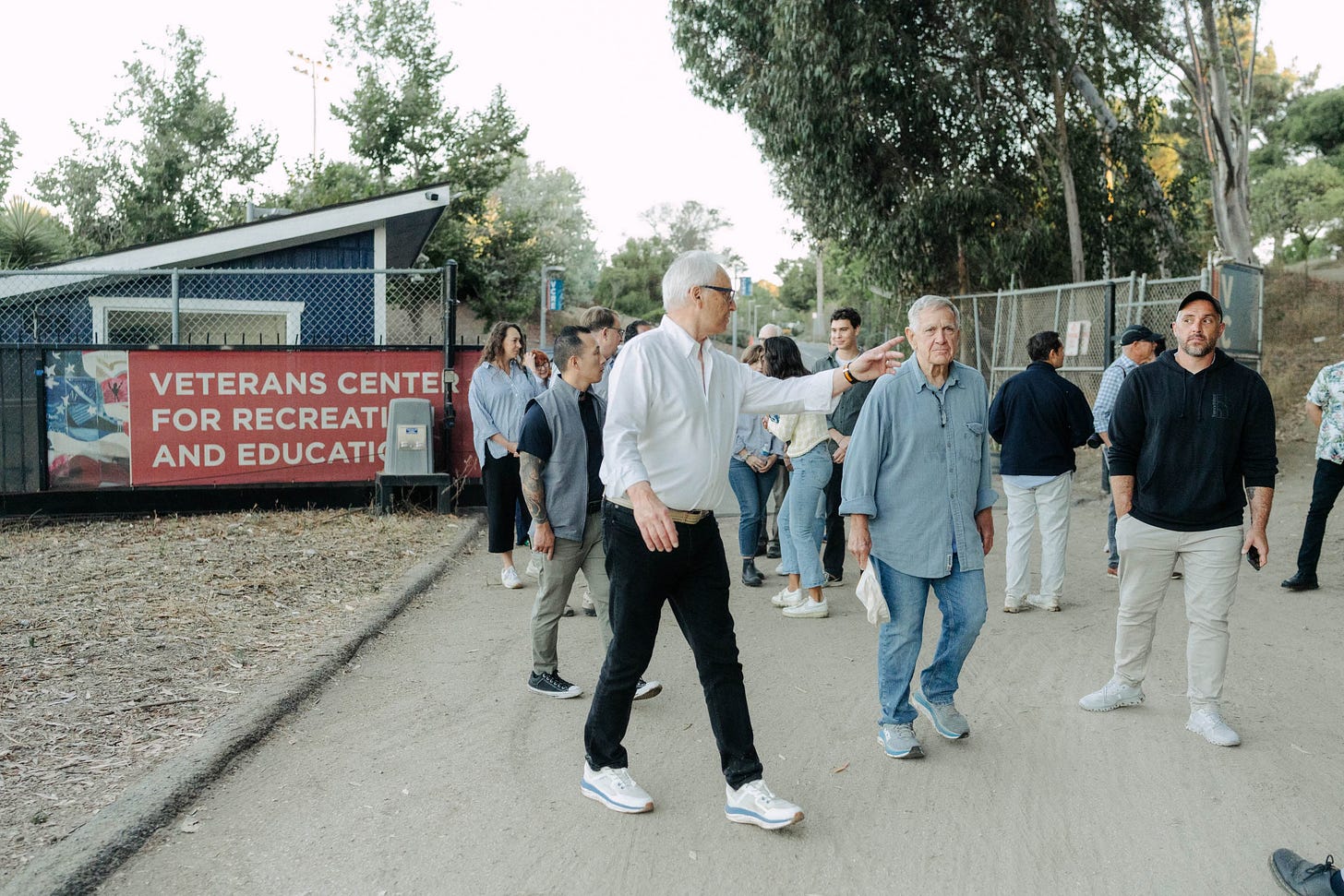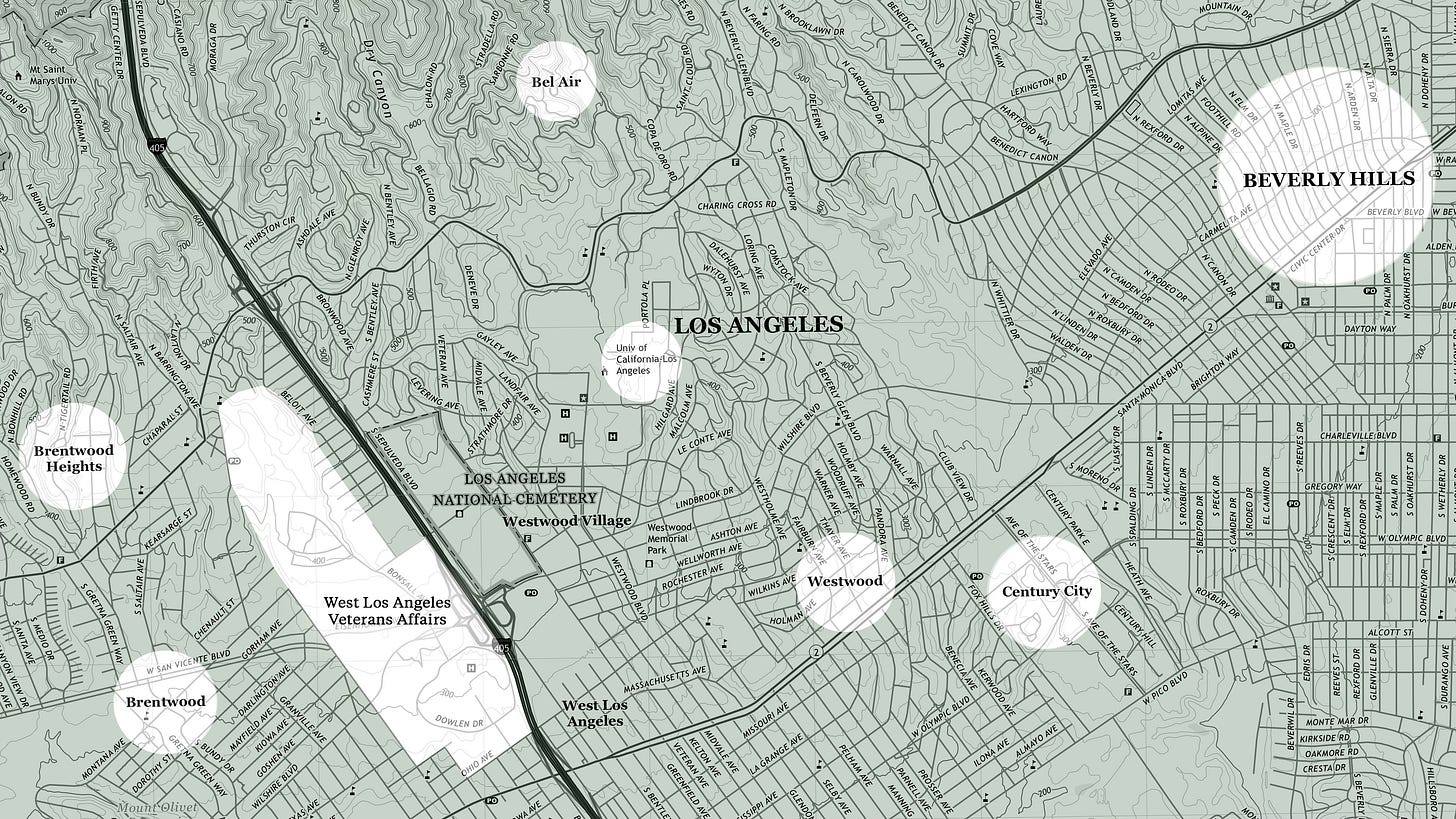“It’s not yours anymore.” Judge Carter presses parties to seal Brentwood School deal
The deal was drawn up hastily Wednesday morning, and hearing the terms in the courtroom veterans' reactions ranged from unenthusiastic to openly hostile.

During an afternoon hearing Wednesday in federal court, lawyers previewed terms for reverting primary use of the Brentwood School’s sports facilities to veterans on the West Los Angeles VA campus in a deal that would include payment of $5 million over five-and-a-half years and the elite K-12 academy’s surrender of small parcels of land including a ball field.
The proposal was unveiled as U.S. District Judge David Carter repeatedly pushed the VA and other parties to swiftly comply with his sweeping ruling in Powers v. McDonough striking down campus leases with Brentwood School, UCLA, the Bridgeland oil company and a parking lot operator and ordering construction of thousands of housing units. The class action lawsuit was filed on behalf of veterans over the VA’s decades-long failure to house homeless and disabled service people on the sweeping 388-acre campus on West Los Angeles’ border with Brentwood, home to stars and politicians.
“It’s not yours anymore,” Carter, referring to Brentwood’s former lease holdings, told the school’s lawyer Skip Miller.
Long Lead has been reporting from Powers v. McDonough every day court has been in session, and we will continue to follow this issue in this newsletter. Subscribe here to get updates sent direct to your inbox as soon as they publish:
Under the terms, which must be approved by the VA, veterans would have exclusive access to sport facilities more than 50 percent of the time. The facilities include a pool, tennis courts and track, weekdays from early morning to 2:30 p.m., and on weekends from 8 a.m. to 2 pm. Students would have the facilities from 2:30 to 8 p.m.; night hours for veterans are under discussion.
The school would also vacate a ballfield and another small parcel of land, beef up shuttle services from veteran buildings to the sports center, increase scholarships for veterans’ children and continue to maintain the facilities.
Brentwood would also pay $2 million to complete restoration of the Wadsworth Chapel on the VA campus, a cause dear to Carter. Significantly, $650,000 a year would go to an as-yet-to-be-formed non-profit trust run by and benefiting veterans, rather than the VA agency.
The deal was drawn up hastily Wednesday morning, and hearing the terms in the courtroom veterans' reactions ranged from unenthusiastic to openly hostile. A significant bloc of veterans will not be satisfied until Brentwood, UCLA, and other tenants are booted from the West LA campus altogether, advocates said.
“That’s our land,” said named plaintiff Jeffrey Powers. “There are people out on the street dying because they have no place to stay.”
Plaintiff’s attorney Roman Silberfeld, however, said veterans don’t oppose the terms but rather are “confused.” Carter repeated several times he had no intention of “taking” land or padlocking or destroying school facilities, although he did muse aloud that perhaps a tennis court could be converted to pickle ball for veterans who aren’t moving so fast. He also stressed student and veteran access should be kept strictly separate.
Carter told the plaintiffs to seek buy-in from other vet groups. But he also warned that if the VA maintained its stated position that no other campus land was suitable for housing, the former leased property could be pressed into service.
The judge had a clerk display a map of the property so he could point out parcels, including a UCLA parking lot and practice field, that he believed are ripe for immediate development.
“You said you want to get going, so get going,” Carter told the parties. Permanent supportive housing agreed to in previous litigation is finally opening after a decade-long delay, but Carter ordered additional units. Developer Steve Soboroff, who is consulting with the court on the judge’s housing order, agreed temporary units could go up quickly, but at least one advocate said a private developer would have to be brought on. VA lawyers declined comment.
“In LA, land is everything.”

Founded in 1972, the Brentwood School has reared the offspring of the city’s most powerful people, including Arnold Schwarzenegger, and counts Maroon 5 frontman Adam Levine as an alum. Its predecessor, the Brentwood Military Academy, had existed since 1902 in several locations as the Urban Military Academy before settling in Brentwood and changing its name. Today, the private, co-ed, K-12 day school is one of Los Angeles’ most expensive and esteemed private schools — not just a vessel for the influential, but an influence in its own right — and has little to do with preparing students for military service.
Since 2014, the elite academy has dropped nearly $1 million on a white-shoe Washington lobbying firm. Last year, a bill floated by an Oregon U.S. House member included an amendment for Brentwood that mirrored UCLA’s deal to secure land on the West LA VA campus. Kathryn Monet, the chief executive officer of the National Coalition for Homeless Veterans, recalled hearing from congressional staffers about Brentwood School lobbyists working Capitol Hill to retain their facilities. “We all know that in LA, land is everything,” she said, “and in that city, there’s not much of it left.” Learn more by reading “Carving up the Map,” Part Four of Home of the Brave.
Soboroff said the agency’s track record does not inspire confidence. “For 50 years a lot of things haven’t been done. The order is for them to build; we will help them but they have got to listen and got to do it or nothing will happen.” Another advocate said the estimate to build the additional units, infrastructure and the town center that veterans want is $500 million. The VA is requesting $369 billion for its fiscal year 2025 budget.
In a brief interview as the hearing ended, former L.A. County mental health chief and a consultant on the Valentini settlement Jonathan Sherin said the VA “had lost all credibility to be a steward of the land.” He said the land was deeded for old soldier housing before the current VA structure existed, and could be placed solely in veteran control.
Soboroff made a passionate plea to Carter to remove the cramped sheds the VA has been using as temporary lodgings. “These are cruel and unusual punishment,” Soboroff said.
“I don’t want tiny houses,” the judge replied. Carter asked the parties to draft an order and come back in session at 4 p.m., but later set the hearing to resume Friday morning.
The next hearing is scheduled for Oct. 4 at 8:00 a.m.
Help “Long Shadow” win a Signal Award — or three!
Big news out today: “Long Shadow: In Guns We Trust” is a finalist for an astounding three Signal Awards. Hosted by Garrett Graff and produced in collaboration with The Trace and Campside Media, this PRX-distributed podcast chronicles America’s decades-long gun violence epidemic and asks “How can we fix it?”
Vote for “Long Shadow” here:
Best Activism / Social Impact Podcast: https://bit.ly/3Bsg897
Best History Podcast: https://bit.ly/3TUoXPj
Best Documentary Podcast: https://bit.ly/3TS9Plq








